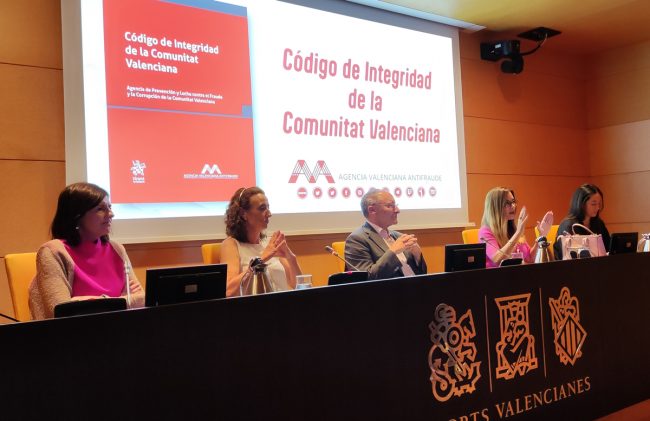The Valencia Anti-Fraud Agency facilitates the recovery of 29 million euros in 3 years and keeps 30 individuals and 1 legal person (company) protected
Valencia, June 23, 2023. Today, June 23, is the World Day of the Whistleblower of Corruption and the Agency has organized for this reason a day to commemorate this celebration that coincides with the enactment this year of Law 2/2023 on the protection of the whistleblower of corruption.
The main conference of the day was given by Alba Lema, international president of the World Compliance Association. Alba Lema specializes in the implementation of compliance management systems as well as in the design and implementation of integrity and business ethics programs in organizations, both nationally and internationally.
This was followed by a round table moderated by the Agency’s Deputy Director of Legal Affairs, Teresa Clemente, with the participation of Arturo León, President of the Economic and Social Committee (ESC); Ana Móner, vice president of the Valencian Association of Consumers (AVACU), and Juan Vega, lawyer of the Agency.
The director of the Agency, Joan Llinares, opened the conference and highlighted “the importance of a day like today in which we want to value the fundamental role played by people who alert, report or report fraud and corruption”. “The Agency was the first authority in Spain to have a Protection Statute for whistleblowers of corruption and currently has 30 individuals and one legal person (company) under protection,” added Llinares.
“This effective protection of whistleblowers, together with the more than 29 million euros of recoverable amounts in the last 3 years, are undoubtedly the best guarantees of the work carried out by the Agency. To this we have to add all that intangible value that cannot be quantified in money derived from the training and prevention actions that the Agency carries out in terms of ethics and public integrity. How many people have not committed an act of fraud and corruption knowing that there is an Agency that can investigate and prosecute this type of action?” concluded Llinares.





